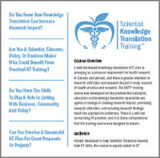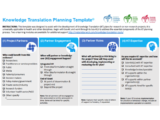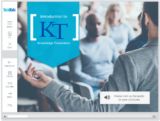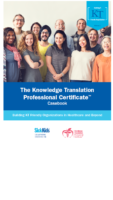These tools are copyrighted by The Hospital for Sick Children. Not-for-profit/academic organizations may share and use them free of charge for internal communication, research, or educational purposes. Please note the terms of use:
• Use of these tools by not-for-profit/academic organizations for internal research or educational purposes is free of charge.
• Use of these tools or any derivative in whole or in part thereof by for-profit organizations or any organization or individual for a commercial purpose or for monetary gain (e.g., use in training courses or consultation) is strictly prohibited without the copyright holder's explicit permission.
• Modification or adaptation to these resources is not permitted.
• Use of this resource requires the appropriate citation of authorship.
• Downloading some of these tools requires registration by submission of an e-mail address (below) and agreement to the above terms.
Knowledge Translation Tools

OVERVIEW
The Knowledge Translation Professional Certificate (KTPC) is a five-day professional workshop (7 shorter days when offered virtually). The curriculum, presented as a composite of didactic and interactive teaching, focuses on the core competencies of KT work in Canada, as identified by a survey of knowledge translation practitioners (Barwick et al., 2010). Developed in The Learning Institute, KTPC™ is hosted three times a year. Each session is open to a maximum of fifteen participants. This one-of-a-kind professional development and networking opportunity is fully accredited by the University of Toronto's Continuing Professional Development Office.
AUDIENCE:
The KTPC course aims to develop the competencies of KT practitioners working across all disciplines, such as health, education, prevention/promotion, agriculture and others. However you identify yourself professionally, this course is for you if you serve an intermediary role between science and practice. We invite the active participation of your employer to help build an organizational culture for KT.
Over 460 Knowledge Translation practitioners and specialists have participated as of Feb 2023.
LEARNING OBJECTIVES
KTPC supports participants in achieving the following:
1. Improve their confidence and ability to carry out knowledge translation activities (e.g., networking, building partnerships, selecting KT strategies, creating knowledge products, advocating for KT, etc.)
2. Acquire and apply new knowledge and skills for KT planning
3. Develop and present a completed KT plan based on their current work
4. Establish short-term, post-workshop KT goals and develop a plan to achieve them
HISTORY OF KTPC
The KTPC™ course was developed in 2010 by the Learning Institute’s Knowledge Translation Team – Dr. Melanie Barwick, Sarah Bovaird and Kelly McMillen and our KTPC Advisory Committee. In addition, KTPC™ acknowledges support from the Alberta Centre for Child, Family and Community Research and the Michael Smith Foundation for Health Research and the work and determination of the Knowledge Translation Team at SickKids.
FEES
Online course fee: CAD 2,500. Includes: Course materials and tools, access to our online collaborative platform and the University of Toronto Continuing Professional Development (CPD) certificate.
In-person course fee: CAD 2,800. Includes: Course materials and tools, access to our online collaborative platform, breakfasts, lunches, refreshment breaks, a networking dinner with participants and faculty, and the University of Toronto Continuing Professional Development (CPD) certificate.
UPCOMING KTPC™ COURSES - will be VIRTUAL until further notice.
March 27–31 and April 3–4, 2023 (online)
June 12–16 and June 19–20, 2023 (online)
October 16–20, 2023 (delivery method to be determined)

A well-developed knowledge translation dissemination (KT) plan is often a proposal requirement for health research funding agencies in Canada and abroad. In addition, various sectors are demonstrating greater attention to effective and impactful dissemination of research evidence. The Specialist Knowledge Translation Training (SKTT™) workshop was developed on the premise that scientists, other practitioners, and educators are agents of change in creating research impact, promoting research utilization, and ensuring that research findings reach the appropriate audiences.
OVERVIEW
The SKTT workshop is intended for those interested in sharing research knowledge with audiences beyond the academic community. The workshop was designed to teach the unique skillset associated with KT dissemination practice. This includes understanding how to increase the impact potential of research, building practical KT dissemination planning skills, and the necessary skills to communicate with various audiences.
AUDIENCE
The workshop is appropriate for scientists (basic, clinical, health services, population health), educators, clinicians and KT professionals (e.g., KT Specialists, KT Managers, and Knowledge Brokers). While the focus is on health, the material is highly relevant to individuals working in other sectors.
LEARNING OBJECTIVES
Upon completion of the workshop, participants will be able to:
1. Define KT and related terms
2. Describe the relevance of KT in its context and role
3. Identify strategies for disseminating evidence and engaging multiple knowledge user audiences
4. Use KT planning tools and resources to develop a KT dissemination plan (e.g., KT Planning Template©, KT Game©)
SECURING TRAINING
There are two options for SKTT training:
Contracting directly with me.:
This is more economical for organizational groups of 10-25 participants.
The base group fee is $6,617.73, including course materials, tools, and access to our online collaborative platform. If delivered in person, additional fees cover hard copy materials (if desired) and travel and accommodation outside Toronto, Canada.
SickKids KT Program:
This option is better for individuals. The fee per person for the virtual course is CAD 650 and includes course materials, tools and access to our online collaborative platform.
The in-person course fee is CAD 825, including course materials, tools, and access to our online collaborative platform, continental breakfasts, lunches, and snacks.
Link below for more information about this option.
List of organizations that have received SKTT training (2004-2023/10).

The KTPT Companion Tool helps to shape the content of your KTPT plan into prose that can be inserted into a research proposal or project plan.

Grant reviewers are often tasked with assessing the quality of a proposed knowledge translation (KT) plan within a research proposal. The KT Plan Appraisal Tool (KT-PAT) guides the assessment of quality for a proposed KT plan. The intended users of the KT-PAT are grant reviewers but individuals may also find it useful to rate their own plan in a formative sense, with a view towards improvement.

The KT Planning Template provides a step-by-step framework for planning research or project-related dissemination activities. The KT Planning Template is proprietary to The Hospital for Sick Children and is protected by copyright. No modifications or adaptations are permitted. The tool is currently available in English, French, and Spanish.

Developed in 2017 by the SickKids’ KT Program, these two e-learning modules support knowledge and practice in KT. The first e-module summarizes our conceptualization of KT. The second e-module introduces and describes the Knowledge Translation Planning Template. Access to the modules is free but requires registration to the SickKids Academy Online platform.

This card game was designed to support knowledge dissemination planning. Based on the Knowledge Translation Planning Template, the KT Game is an educational group activity.

The casebook offers insight for those looking to develop or strengthen organizational capacity for knowledge translation (KT). Included are 10 cases written by alumni of our Knowledge Translation Professional CertificateTM (KTPC) course, who represent a variety of sectors (consulting, non-profit, academia, education, healthcare) and organization types (research, funders, hospitals, public sector). Each case describes the organization’s KT program, their KT team, incentives and opportunities that enabled KT growth, barriers to KT and how they were overcome, practical tools, and insights on the future role and value of KT professionals. The casebook aims to identify key ingredients that make an organization KT friendly and empower readers to develop or improve their own KT programs.
